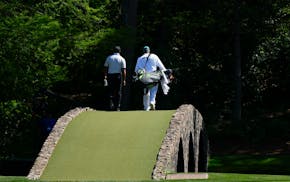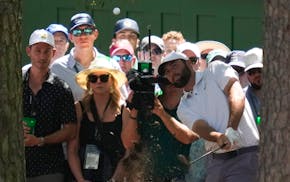If Thomas Vanek played in the NFL, he'd be the proud new owner of the phrase "I play when I want to play."
If he played in the NBA, he would be the exception who justifies the false stereotype that basketball players don't give maximum effort.
Instead, he is lucky to be a player on a team that often obscures his failings in a state where he once helped a beloved college team win a national championship.
Thomas Vanek is getting a pass.
And, as has been the case so often in these playoffs, he's doing nothing with it.
The next time Wild fans beg Chuck Fletcher to sign a former Gopher, he should hold up a picture from the Wild's 1-0 loss to Chicago on Tuesday. A picture of Vanek refusing to join the fray.
Tuesday night, the Wild played its latest most important game of the season. A victory would position the team to tie the series at home, avoid a 3-0 deficit and give the Chicago Blackhawks reason to doubt their invincibility in a playoff against Minnesota.
It was predictable that the Wild responded with a flurry of shots early in the game. These are the games that test a prideful player's will.
Once Vanek missed a shot or two and the game became a grind, he disappeared. In an effort sport like hockey, you are never more visible than when you disappear.
Vanek repeatedly carried the puck across the blue line, then stopped, ignoring open ice and his teammates, sometimes turning toward the boards and holding the puck, as if needing to catch his breath. Or because he actually needed to catch his breath.
At the least, he could have followed the Wild's game plan of chipping the puck in and attacking on the forecheck. That's what this team was built to do.
At the most, he could have used his estimable skills to stick-handle through traffic and create shots for himself or his linemates.
The problem with those approaches, for Vanek, is that they require effort. In the latest most important game of the season, Vanek was not inclined to make one. He barely attempted to forecheck.
Sometimes, when the puck was in the defensive zone, he hung out by the far blue line, like a lazy pickup basketball player hoping for a long outlet pass and a free layup. It's a wonder he expended enough energy to tie his skates, although he may have had someone do that for him.
Every general manager and coach in every professional league makes the occasional deal with the devil, trading reliability for talent. The hope is that the player's production will outweigh his annoying tendencies.
With Vanek, this approach has occasionally worked. He was productive when the Wild played well during the last three months of the season. He hit a crossbar against the Blues and a post against the Blackhawks. He has come close to justifying his existence on the roster, just as the Wild has come close to making the second round of the playoffs competitive.
What's problematic is that when a player like Vanek doesn't produce, he invites questions about his motivation while becoming a rink-wide liability. His lack of effort has robbed the Wild of the comfort of the oldest rationalization in sports: "At least we gave it our best effort."
Vanek isn't the Wild's only problem. He's merely the most obvious.
Jason Pominville is dragging down the Wild's top line. Mikko Koivu produces little offensively. Goalie Devan Dubnyk has been less than spectacular.
The difference between other lapsed Wild players and Vanek? Vanek is the only player obviously not giving his full effort. It's one thing to fail because you lack skill, or have fallen into a slump. It's another to violate the code that identifies hockey players as the toughest and most committed of athletes.
The Wild's mantras about commitment and mental toughness will ring hollow as long as Vanek is getting ice time, and playing playoff hockey as if he'd rather be playing golf.
Jim Souhan's podcast can be heard at souhanunfiltered.com. On
Twitter: @SouhanStrib. • jsouhan@startribune.com

Souhan: Why Tiger Woods should keep swinging
Souhan: Scheffler wins Masters again, shows what makes him special
Morikawa falters in final round at Masters

Keeping up with the Joneses who helped design Augusta National's classic back nine


![Minnesota Wild head coach Mile Yeo adjusted his glasses in the third period. ] CARLOS GONZALEZ cgonzalez@startribune.com, May 5, 2015, St. Paul, MN, X](https://arc.stimg.co/startribunemedia/ERP2SNKRDLVRYHHQG6Q5IJWDYI.jpg?w=600&h=600&auto=format%2Ccompress&cs=tinysrgb)